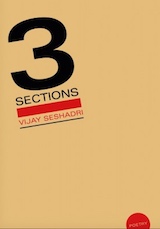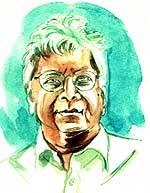 Hardcover: 64 pages Hardcover: 64 pages
Publisher: Graywolf Press ( 2013)
Language: English
PK:
|
Orwell says somewhere that no one ever writes the real story of their life.
The real story of a life is the story of its humiliations.
If I wrote that story now—
radioactive to the end of time—
people, I swear, your eyes would fall out, you couldn’t peel
the gloves fast enough
from your hands scorched by the firestorms of that shame.
(“Memoir”)
3 Sections, Vijay Seshadri’s fourth collection of poetry, encourages the reader to question what constitutes a poem. The forms here vary greatly and include a prose lyric essay. Such variety allows one to stretch his or her poetic definition, prompting the question: when does it stop being a poem? This questioning becomes a rich enterprise alongside Seshadri’s theme of memoir or, as the passage above addresses, our ability to write the real story of our lives.
The poems at times contain philosophical interrogation; however, the voice is never at an intellectual remove. Rather, the speaker is amiable, scintillatingly challenging, and reveals a resonant sense of humor. The poem “Surveillance Report,” for instance, is hilarious in its strangeness. Seshadri writes, as from a talk radio program,
Caller Y wants to share that my fearless candor has given her permission
to become utterly transparent herself.
Thank you, Caller Y. Your inner light can be seen from here.
Volleying between panache to deadpan, the observations are delivered in a way that feels at once in jest and sincere. In “Visiting Paris,” the speaker admits,
I was wanted in Paris. Paris, astounded by my splendor
and charmed by my excitable manner,
waited to open its arms to me.
A combination of that lighthearted voice and thoughtfulness, reverence and irreverence, is found in the poem “New Media.” Focusing on that which is usually ignored, the text of potentially pernicious email, the speaker takes this minutia seriously. Seshadri writes, “Now I know words are experience.” The poem offers some absurd subject lines:
“2 People Searched for You”
“In the beginning was the . . .”
“re: Miss Exotic World”
Out of their original context, and within the pages of a poetry collection, we realize how familiar these lines feel. They are brought to the reader’s consciousness like the newspaper headlines and typography in Joyce’s Ulysses—chance phrases, boggled text, and here in Seshadri’s poem, dubious subject lines, show they are already, at some level, part of our reading life (how much of my life is reading subject lines?). This adds another perspective to the elusive question of what is or is not a poem.
3 Sections also includes “Three Urdu Poems,” distanced from cynicism and theory. Invoking the 19th century Urdu poets, the first part entitled “Mirza Ghalib,” closes on the lines, “You are mystical, Ghalib, and, also, you speak beautifully. / Are you a saint, or just drunk as usual?” This three-part poem stands out as an exultant lyric.
“Nursing Home,” another stand-out, portrays how we rely on language while considering degenerative mental disease. Seshadri references the “perisylvian,” or speech center of the brain; he writes, “Hydrocephalus (NPH), classical Alzheimer’s disease (AD), and the deformations in mental recognition and function,” then abruptly switches to a dialogue, dislocating the reader. Interrupting the scientific language, two alternate voices ask variants of the question, “Is she really dead? No, she’s not dead, but she’s acting the fool.” The simple language is moving after the neural scientific discourse. This relationship—anxiety of losing our ability to process the world and the need for storytelling—is explored through this poem of contrast.
The poem at the center of 3 Sections is “Pacific Fishes of Canada.” Recounting international maritime relations during the 1970s-80s, specifically the king salmon fishing industry, it provides sensory accounts of storms, reports consequences of The Magnuson Act of 1976, and addresses the reader (“The word misgivings couldn’t begin to comprehend the mortification I felt at being on a boat on the Bering Sea in this kind of weather”). Some of the most enjoyable moments detail the speaker’s life-halting seasickness. Regardless of the realities described, at a dense thirteen pages, its emotional weight is earned by a confidence in its own shape.
Immediately following this prose section is a poem entitled “Personal Essay.” The title and length give the reader another angle from which to see a poem’s parameters. As with “Nursing Home,” “Personal Essay” also questions our brain’s ability to grasp then lose control of language:
Stare at a word in a book long enough and that word
slowly uncouples itself from what it means.
The meaning backs away.
The meaning is being evicted from
the structure of glyphs that it has rented.
The meaning of the word is making
dejected, wounded gestures with its hands as it retreats
to the precipice of the incomprehensible, where it gives us
a tender look, then turns and jumps.
(“Personal Essay”)
This passage surpasses the acknowledgment of a phenomenon (staring at a word until it loses meaning) until the idea becomes as compelling as a character, “dejected” and making “wounded gestures.” 3 Sections is comprised of poems of this kind of originality. A modest conclusion to a triathlon of a book, the final section ends on a poem entitled, “Light Verse,” an understatement to complement Seshadri’s striking collection.
16 Jan 2014 | Green Mountains Review
 Vijay Seshadri Vijay Seshadri
Poet, essayist, and critic Vijay Seshadri was born in India and came to the United States at the age of five. He earned a BA from Oberlin College and an MFA from Columbia University. In the citation for the 2014 Pulitzer Prize, the committee called Vijay’s book 3 Sections, “a compelling collection of poems that examine human consciousness, from birth to dementia, in a voice that is by turns witty and grave, compassionate and remorseless.”
|


 Vijay Seshadri
Vijay Seshadri